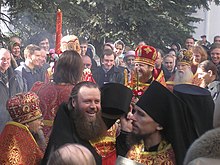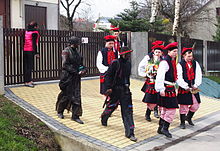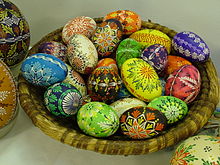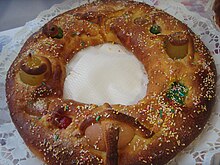| Easter Monday | |
|---|---|
| Type | Christian |
| Date | Day after Easter Sunday |
| 2023 date |
|
| 2024 date |
|
| 2025 date |
|
| 2026 date |
|

Easter Monday is the second day of Eastertide and a public holiday in some countries. In Western Christianity it marks the second day of the Octave of Easter; in Eastern Christianity it marks the second day of Bright Week.
Religious observances
[edit]Eastern Christianity
[edit]
In the Eastern Orthodox Church and Byzantine Rite Catholic Churches, this day is called "Bright Monday" or "Renewal Monday". The services, as in the rest of Bright Week, are quite different from during the rest of the year and are similar to the services on Pascha (Easter Sunday) and include an outdoor procession after the Divine Liturgy. While this is prescribed for all days of Bright Week, often they are only celebrated on Monday and maybe a couple of other days in parish churches, especially in non-Orthodox countries.
Should the calendar date for the feast day of a major saint (e.g. Saint George on April 23, or the patron saint of a church) or one's name day fall within Holy Week and Pascha itself, the feast is transferred to Easter Monday.[1][2]
Western Christianity
[edit]In Western Christianity, Easter Monday is the second day of Eastertide, as well as the second day in the Octave of Easter.[3]
In the Lutheran Churches, the Gospel for Easter Monday concerns the Road to Emmaus appearance.[3]
National observances
[edit]This section needs additional citations for verification. (February 2020) |
Australia
[edit]In Australia, Easter Monday is a public holiday.[4] Some people enjoy outdoor sporting events, such as the Oakbank Easter Racing Carnival in South Australia,[5] and the Stawell Gift in Victoria,[6] as well as a traditional AFL match between Geelong Cats and the Hawthorn Hawks at the MCG. Since 2014, The NRL have held the Easter Monday match (NRL) between the Parramatta Eels and Wests Tigers match at Stadium Australia. Australian Three Peaks Race in Tasmania until 2011.[7]
Austria
[edit]In Austria and Southern Germany, there is the traditional "Emmausgang", commemorating the walk of the disciples to Emmaus, to which Jesus followed them without being recognized.
Canada
[edit]Easter Monday (French: Le Lundi de Pâques) is the Monday immediately following Easter Sunday and is a statutory holiday for federal employees. Although not mandatory by federal regulation, some employers also give this day off to employees out of common practice. Additionally, this holiday succeeds Good Friday (the Friday preceding Easter), which is a mandatory holiday for all employees, giving those workers an extra long weekend in March or April. An exception to this rule is in Quebec, where employers must give either Good Friday or Easter Monday off to employees. In provinces where Family Day, Islander Day, or Louis Riel Day are not observed, Easter Weekend is the first provincial holiday after New Year's Day.
Central Europe
[edit]

Śmigus-dyngus (or lany poniedziałek, Polish for Wet Monday) is the name for Easter Monday in Poland and the diaspora. In the Czech Republic it is called velikonoční pondělí, in Slovakia veľkonočný pondelok and in Hungary Vízbevető. All these Catholic countries (and some others) practice the unique ancient custom on this day.[8] Traditionally, boys and men pour a bucket of water or perfume on girls and women and/or spank their buttocks and legs with long thin twigs (pussy willow) or switches made from willow, birch or decorated tree branches. A legend says that it keep women healthy, beautiful, and fertile during the whole next year.
Another related custom, unique to Poland, is that of sprinkling bowls (garce) of ashes on people or houses, celebrated a few weeks earlier at the "półpoście". This custom is almost forgotten, but still practiced in the area around the borders of Masuria and Masovia.
Egypt
[edit]In Egypt, the ancient festival of Sham Ennesim (Egyptian Arabic: شم النسيم, literally meaning "smelling of the breeze") is celebrated by the Coptic Orthodox Church (i.e. Eastern) Easter Monday, though the festival dates back to Ancient Egypt times (about 2700 BC). It is an Egyptian national holiday. Traditional activities include painting eggshells of boiled eggs, taking meals outdoors, and eating boiled eggs, lettuce, fesikh (pickled mullet (fish)) with lemon and scallion.
Germany
[edit]In Germany, people go out into the fields early in the morning and hold Easter egg races.[9] For Roman Catholics, Easter Monday is also a Holy Day of Obligation in Germany.[10]
Ireland
[edit]In Ireland it is a day of remembrance for the men and women who died in the Easter Rising which began on Easter Monday 1916. Until 1966, there was a parade of veterans, past the headquarters of the Irish Republican Army at the General Post Office (GPO) on O'Connell Street, and a reading of the Proclamation of the Irish Republic.
Italy
[edit]In Italy, Easter Monday is an official public holiday and is called “Lunedì dell'Angelo” (“Monday of the Angel”), “Lunedì in Albis” or more commonly “Pasquetta”. It is customary to hold a family picnic in the countryside or barbecues with friends.
New Zealand
[edit]In New Zealand it is a National Public Holiday.[11] Schools often extend the weekend to the Tuesday to give students a 5-day break.[12]
Spain
[edit]
In Spain, Easter Monday is an official public holiday in Catalonia, the Land of Valencia, the Balearic Islands, Navarre, the Basque Country, Cantabria, and La Rioja.[13] In Catalonia, the Land of Valencia, and Murcia a feature of this day is a pastry called Easter mona.[14] It is usually given by godparents to their godchildren, and it is traditional for families or groups of friends to gather for a trip somewhere, like the countryside, to eat the mona.[15]
Netherlands
[edit]In the Netherlands, Easter Monday is an official public holiday.[16] Apart from church services in some locations in the Dutch Bible Belt, there are no widespread festivities or traditions for the "Second Easter Day" ("Tweede Paasdag").
United States
[edit]
In the United States, Easter Monday is not a federal holiday [17] and there are few national observances apart from traditions such as the White House Easter egg roll.[18] On a local level, the day is informally observed in some areas such as the state of North Dakota, and some cities in New York, Michigan, and Indiana. Easter Monday was a public holiday in North Carolina from 1935 to 1987, due to the early-20th-century tradition of state government workers taking the day off to attend the annual baseball game between North Carolina State College and Wake Forest College.[19][20][failed verification] Texas and Maryland schools often have two holidays on Good Friday and Easter Monday. In some states and districts, public schools and universities are closed on Easter Monday, often part of spring break.
Dyngus Day
[edit]Traditionally Polish areas of the United States observe Easter Monday as Dyngus Day.[21][22] Dyngus Day celebrations are widespread and popular in Chicago; Cleveland;[23] Buffalo, New York; Wyandotte and Hamtramck in Michigan; South Bend and La Porte in Indiana; and Hanover, New Hampshire.
United Kingdom
[edit]Only England, Wales and Northern Ireland observe Easter Monday as a bank holiday, with many large retailers being closed on Easter Monday.[24] It is not an official public holiday in Scotland, but might be locally observed, with large retailers being open; but with reduced opening hours.[25]
South Africa
[edit]In South Africa, Easter Monday is the last day of the holy weekend. It is known as Family Day and is a public holiday. After this day, people return to work and children to school, so it is a day of rest.
Ukraine
[edit]In Ukraine, Easter Monday is celebrated. It is a public holiday. After this day, people return to work and children to school, so it is a day of rest.[26]
See also
[edit]- Bright Week – Seven days beginning on Easter in Eastern Christianity
- Octave of Easter – Western Christianity celebration
References
[edit]- ^ "Part IV". www.holytrinitymission.org. Archived from the original on 26 July 2011. Retrieved 30 May 2021.
- ^ Тvпико́нъ сіесть уста́въ [The Typicon which is the Order], Moscow: Сvнодальная тvпографiя, 1907, p. 468 (Title here transliterated into Russian; actually in Church Slavonic)
- ^ a b Gramenz, Stefan (6 April 2021). "Eastertide Lections". The Lutheran Missal.
- ^ "Public holidays". maps.finance.gov.au. Retrieved 11 June 2024.
- ^ "Oakbank |". www.theracessa.com.au. Retrieved 19 September 2019.
- ^ "Stawell Gift – Australia's richest footrace". www.stawellgift.com. Retrieved 19 September 2019.
- ^ "Three Peaks Recess. 2015 Race Cancelled". Archived from the original on 1 March 2017. Retrieved 14 April 2017.
- ^ Asiedu, Dita (12 April 2004). "Easter Monday Radio Prague special". Český rozhlas 7. Radio Praha. Retrieved 9 May 2009.
- ^ "Easter Monday in Germany". www.timeanddate.com. Retrieved 30 May 2021.
- ^ (in German) Partikularnorm Nr. 15 der Deutschen Bischofskonferenz Archived 25 March 2009 at the Wayback Machine. Accessed 8 April 2009.
- ^ "Public holidays and anniversary dates". New Zealand Government. Retrieved 30 May 2021.
- ^ "Why is Easter Tuesday a school holiday?". Stuff. 3 April 2018. Retrieved 30 May 2021.
- ^ "Resolución de 23 de octubre de 2023, de la Dirección General de Trabajo, por la que se publica la relación de fiestas laborales para el año 2024". 23 October 2023. Retrieved 1 April 2024.
- ^ "Twenty things you didn't know about the Mona de Pasqua". Barcelona City Council. Retrieved 12 April 2020.
- ^ "La mona de Pasqua". Festes.org (in Catalan).
- ^ "Easter Monday in the Netherlands". www.timeanddate.com. Retrieved 30 May 2021.
- ^ "Federal Holidays". U.S. Office of Personnel Management. Retrieved 1 April 2024.
- ^ "The White House Easter Egg Roll". whitehouse.gov. Retrieved 19 September 2019 – via National Archives.
- ^ Peeler, Tim (2 April 2013). The Easter Monday Baseball Game: North Carolina State and Wake Forest on the Diamond, 1899-1956. ISBN 978-0786474523.
- ^ "NC State Alumni Association". Archived from the original on 14 December 2016. Retrieved 21 April 2014.
- ^ "Dyngus Day USA". DyngusDay.com. Archived from the original on 9 April 2011. Retrieved 26 April 2011.
- ^ "What is Dyngus Day?". DyngusDay.com. Archived from the original on 29 April 2011. Retrieved 26 April 2011.
- ^ Heaton, Michael (22 April 2011). "Come Out Next Monday Out [sic] for Cleveland's First Annual Dingus Day". The Plain Dealer. Retrieved 26 April 2011.
- ^ "UK Bank Holidays". gov.uk. Retrieved 10 April 2023.
- ^ "Easter Monday in the United Kingdom". www.timeanddate.com. Retrieved 30 May 2021.
- ^ "Easter Monday in Ukraine". www.timeanddate.com. Retrieved 11 April 2023.
